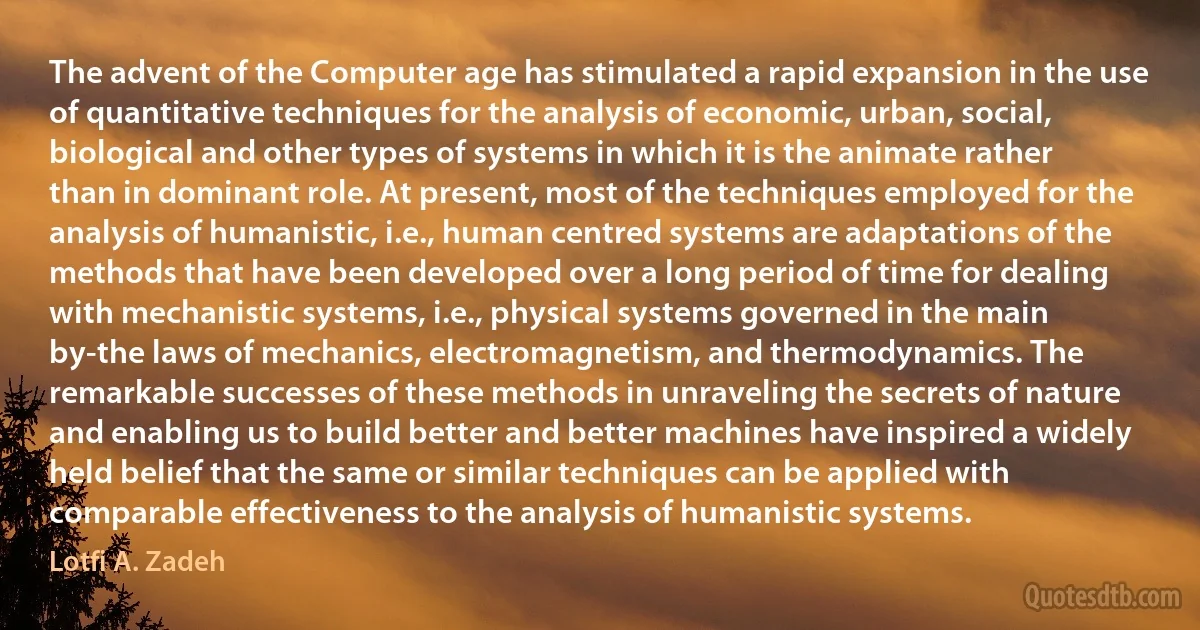
The advent of the Computer age has stimulated a rapid expansion in the use of quantitative techniques for the analysis of economic, urban, social, biological and other types of systems in which it is the animate rather than in dominant role. At present, most of the techniques employed for the analysis of humanistic, i.e., human centred systems are adaptations of the methods that have been developed over a long period of time for dealing with mechanistic systems, i.e., physical systems governed in the main by-the laws of mechanics, electromagnetism, and thermodynamics. The remarkable successes of these methods in unraveling the secrets of nature and enabling us to build better and better machines have inspired a widely held belief that the same or similar techniques can be applied with comparable effectiveness to the analysis of humanistic systems.
Lotfi A. ZadehRelated topics
age biological build comparable computer dominant effectiveness enabling expansion hold human mechanics nature present rapid thermodynamics time use LawsRelated quotes
It is not true, out of geometry, that the mathematical sciences are, in all their parts those models of finished accuracy which many suppose. The extreme boundaries of analysis have always been as imperfectly understood as the tract beyond the boundaries was absolutely unknown. But the way to enlarge the settled country has not been by keeping within it, but by making voyages of discovery, and I am perfectly convinced that the student should be exercised in this manner; that is, that he should be taught how to examine the boundary, as well as how to cultivate the interior. ...allowing all students whose capacity will let them read on the higher branches of applied mathematics, to have each his chance of being led to the cultivation of those parts of analysis on which rather depends its future progress than its present use in the sciences of matter.

Augustus De Morgan
There science is dealing with physical facts, in art we are dealing with psychic effects. With this I come to my first statement: 'The source of art – that is, where it comes from – is the discrepancy between physical fact and psychic effect'. That's what I'm talking about. When I want to speak about why I am doing the same thing now, which is squares, for – how long? – 19 years. Because there is no final solution in any visual formulation. Although this may be just a belief on my part, I have some assurances that that is not the most stupid thing to do, through Cezanne whom I consider as one of the greatest painters. From Cézanne we have, so the historians tell us – 250 paintings of Mont St. Victoire. But we know that Cézanne has left in the fields often more than he took home because he was disappointed with his work. So we may conclude he did many more than 250 of the same problem.

Josef Albers
Keynes didn't make an all-out assault on Economic Man, but he often resorted to plausible psychological theorizing rather than careful analysis of what a rational decision-maker would do. Business decisions were driven by "animal spirits,” consumer decisions by a psychological tendency to spend some but not all of any increase in income, wage settlements by a sense of fairness, and so on.
But was it really a good idea to diminish the role of Economic Man that much? No, said Friedman, who argued in his 1953 essay "The Methodology of Positive Economics” that economic theories should be judged not by their psychological realism but by their ability to predict behavior. And Friedman's two greatest triumphs as an economic theorist came from applying the hypothesis of rational behavior to questions other economists had thought beyond its reach.

Paul Krugman
The change toward larger Gestalten and the necessity of this change for both humanistic and formal reasons can be illustrated by considering Sullivan's emphasis upon the phenomena of interaction. This emphasis is very clearly part of a defense of man against the older, more mechanistic thinking which saw him so heavily determined by his internal psychological structure that he could easily be manipulated by pressing the appropriate buttons - a doctrine which made the therapeutic interview into a one-way process with the patient in a relatively passive role. The Sullivanian doctrine places the therapeutic interview on a human level, defining it as a significant meeting between two human beings. The role of the therapist is no longer to be dehumanized in terms of definable purposes which he can plan, and the role of the patient is no longer dehumanized into that of an object of manipulation.

Gregory Bateson
...yet we are told that this great nation, with such a record of splendid achievements in the past and in the present, is unfit to make its own laws, is unfit to control its own finance, and that it is to be placed as if it were a nation of children or lunatics, under the tutelage and guardianship of some other body-and what body? Who are the guardians of this mighty people? Who are they? With all respect, I shall have to make exceptions; but I am speaking of them as a whole. ... They are men who have neither the training, the qualifications, nor the experience which would fit them for such a gigantic task. They are men whose sole qualification-speaking in the main, and for the majority of them-they are simply men whose sole qualification is that they are the first born of persons who had just as little qualification as themselves.

David Lloyd George
